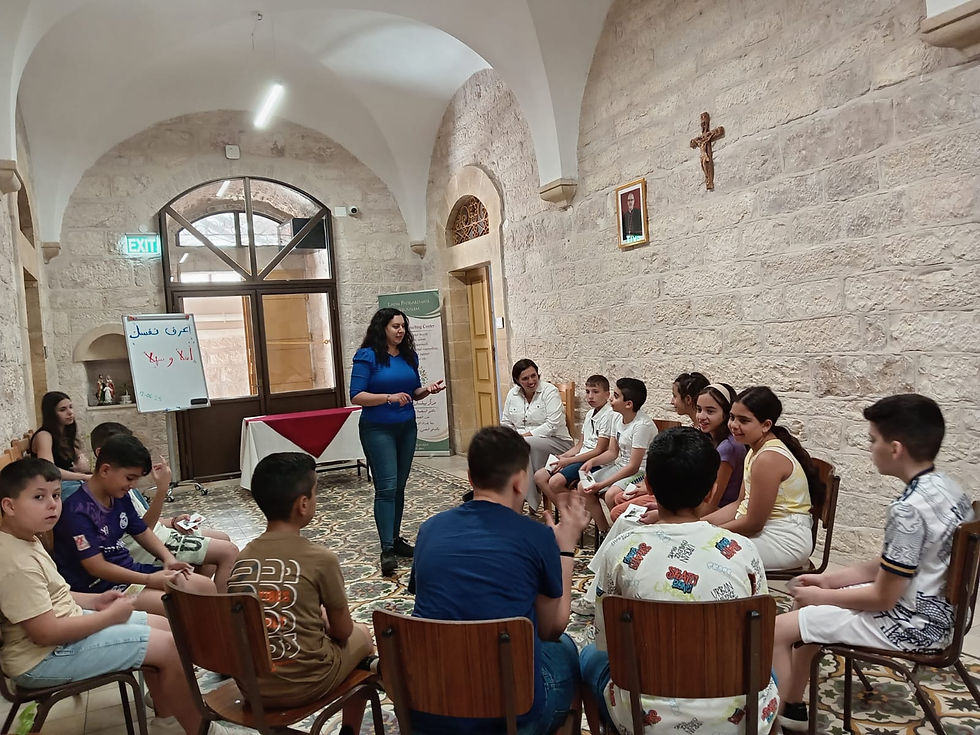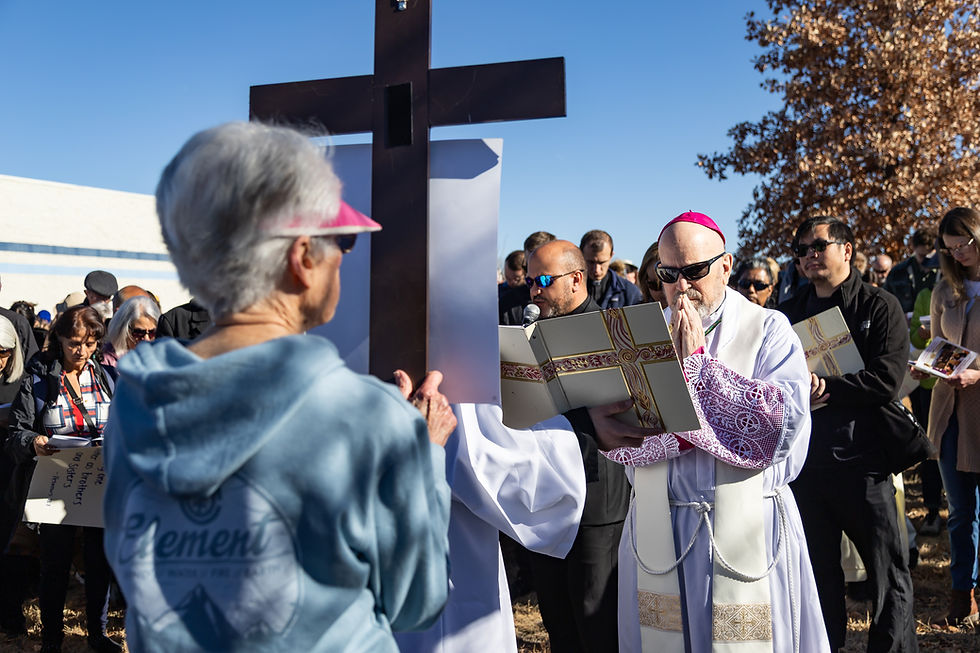Catholic Counseling Center Offers Support for War-Traumatized West Bank Residents
- National Catholic Register

- Oct 25, 2025
- 6 min read
Bailasan, championed by the Latin Patriarchate and Aid to the Church in Need, has already helped hundreds of people.

By Sabrina Ferrisi/National Catholic Register
For the average young person living in the West Bank, life is very hard. Teenagers there have never known what it means to live in a place of peace.
Within the city of Bethlehem, a short distance from the Church of the Nativity where Jesus was born, is a beacon of light called Bailasan, a Catholic counseling center.
This center opened in June 2024 and is the first Catholic mental health institution for the Christian community in the West Bank. It operates through a holistic approach of psychological therapy and spiritual counseling. The name Bailasan is inspired by the biblical verse in Jeremiah 8:22: “Is there no more balm (Bailasan) in Gilead? Can no physician be found there?”
For the director of Bailasan, Father Francis Shahin, this center is a dream come true. He has a background in psychological and spiritual counseling.
“We don’t have this habit of psychological counseling here, so people were a little bit afraid in the beginning. It is the mentality here. We are trying to begin with group therapy sessions, to teach people what this means,” said Father Shahin, a priest of the Latin Patriarchate of Jerusalem.

But the hardship of daily life prompts people to pursue help.
“The main reasons why people come to seek counseling here is stress and anxiety,” said Sister Lorena Sesatty Saenz, a Comboni missionary from Mexico who is working as a psychologist at the center. “We see cases where there is an absence of the father, who had to move abroad to find work. This creates difficulties for the mother. The fathers are away, and the children here start to rebel.”
This often translates into low academic performance.
“We see couples in difficulty because of their economic situation. This brings a great deal of stress. It often causes internet and mobile-phone dependence,” said Sister Lorena.
Some families need to go to Jerusalem for work, which entails going through checkpoints.
“There are many depressed people here. People want to move out, but they cannot move easily from the West Bank. There are many checkpoints even within the West Bank. Often, to move from one place to another, people have to spend time waiting in lines,” explained Father Shahin.
“Another issue is that many of the young people are leaving. They all have this idea that if they can just move abroad, everything in their life will get better. They feel like foreigners in their own city,” added Sister Lorena.
Sometimes, Israeli soldiers have entered Bethlehem and stayed for many days. On those occasions, people stay locked in their own homes, afraid to go outside.
“What I often hear from young people is that their city has always been in conflict and that they just want to experience peace. They want to go to the sea, or to a forest and just experience it. They don’t see themselves as staying here. They see older siblings who finish college and find no jobs for years. So they spend their days following social-media influencers and dreaming about life outside of here. Meanwhile, time is passing,” explained Sister Lorena.
How people are living their present is addressed by Bailasan’s staff.
“In our intervention, we focus on how people are managing their time and how they can live in the present moment,” said Sister Lorena. “They begin to see that this is ‘my’ present. Nobody can take that away from you. When I lived in Jordan and worked with refugees, I saw the same kind of thing: where people lived in the past or the future. But people need to learn to live in the present to find themselves and to find God.”
The Latin Patriarchate of Jerusalem encouraged the creation of Bailasan and oversees expenses. Aid to the Church in Need has paid for recent renovations to the building where Bailasan operates. Cardinal Pierbattista Pizzaballa of Jerusalem visited the center this past June.
“He listened to us, asked questions and ate with us. Our staff is really motivated,” said Sister Lorena. “Cardinal Pizzaballa really believes in this.”
Father Shahin explained that priests advertise through word of mouth, though the center also has a Facebook page and is building a website; email and WhatsApp ensure that local priests know of this important resource.

A Listening Ear
The counseling is free, though client donations are accepted.
Group therapy sessions have led to clients requesting individual therapy. Others are recommended to come by local priests.
“Most come for problems of depression, decision-making issues and phobias. When we meet with an individual, we meet every 10 days to two weeks,” explained Father Shahim.
All of the counseling is done in Arabic, though the counselors also speak English.
“Teenagers are depressed,” observed Father Shahim. “But they are not trying to commit suicide. From the economic and political point of view, they feel hopeless, but their hope rests in their faith in God.”
Hala Batarseh is a medical social worker at Bailasan.
“I have a great passion for healing people in a humanist way,” said Batarseh. “My role includes, primarily, counseling one-on-one and group counseling. I give workshops to groups: teens, mothers, couples.”
Part of Batarseh’s work involves working with people to express their feelings through art therapy.
“I use different approaches, sometimes through drawings, other times using clay,” she said.
For example, one of the workshops at Bailasan is for mothers of children with disabilities. Mothers are asked how they feel and encouraged to express themselves by painting on the jars that are later used for planting.

Another workshop is for teenagers ages 14, 15 and 16 to foster self-awareness.
“This helps them know themselves; to know their own talents. We give them certificates at the end with a small graduation ceremony. We also teach them leadership skills,” said Batarseh.
Bailasan is offering for the first time a workshop for couples preparing for marriage from September to December.
“We will have a series of sessions. A doctor will come to speak about medical problems. Someone else will come to discuss financial problems and how to create a budget. All of this is from a Catholic point of view. We have a priest who will speak about the importance of prayer between the couple,” explained Batarseh.

Lives Changed
The Bailasan staff see positive results from their work.
Since its opening, Bailasan has seen 46 people individually and is currently following 25 ongoing cases, including couples, adolescents, families and individuals. The center has hosted eight training courses, networking with health professionals, workshops and support groups, reaching a total of 175 people. Outside the center, the staff have implemented approximately 15 projects in schools, parishes and other institutions, reaching around 700 more people.
For the war-traumatized people of the West Bank, Bailasan has become a desperately needed balm and oasis for healing.
As a Catholic, Batarseh believes in using Bible verses to support the healing process.
“I look at verses on grief after loss or forgiveness for couples. The Bible gives power to couples. I empower them to read the verses. It motivates them and is a great help. It gives support,” she said.
“Honestly, I can say that this has been a good experience. I had a dream about opening up a center for counseling, bringing together psychological and spiritual counseling. I felt the necessity of this in my parish in Jordan, where I worked for 30 years, especially for the young people,” said Father Shahin.

Abeer Andoni, 23, from Bethlehem, has had a positive experience with counseling at Bailasan.
“They have taught me to be more organized and patient in my life,” said Andoni. “I met Mrs. Hala through my church and told her that I was going through a difficult time. She advised me to come.”
The young woman met with Batarseh for several one-on-one sessions to discuss stress related to her job search. Andoni would like to be a home health care worker for the elderly. Her dream is to move to the United States.
“Bailasan helped me not to give up. I have been looking for work because of the war,” said Andoni. “We created a program together for things I could do at home: reading and learning new skills. The results have been positive. Mrs. Hala is really nice. She really worked with me through the sessions and gave me a good preparation.”








